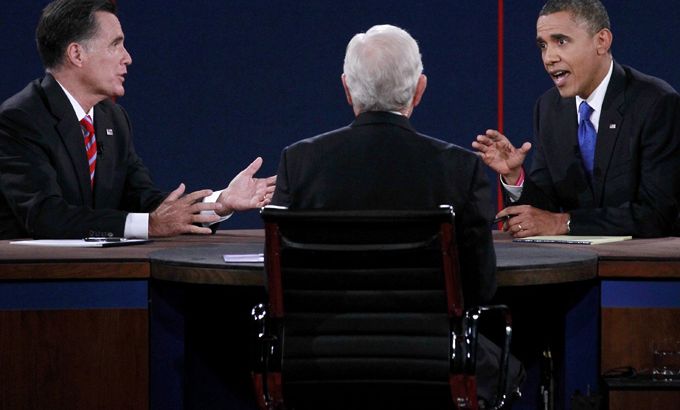Economic growth accelerates in US
Improved GDP figure attributed to higher consumer spending, lower imports and jump in federal government spending.

The US economy grew at a slightly faster two per cent annualised rate from July through September, buoyed by more spending by consumers and the federal government.
Growth accelerated from the 1.3 per cent rate of the April-June quarter, the Commerce Department said on Friday.
Keep reading
list of 4 itemsBoeing hit with 32 whistleblower claims, as dead worker’s case reviewed
US imposes new sanctions on Iran after attack on Israel
A flash flood and a quiet sale highlight India’s Sikkim’s hydro problems
The report is the final snapshot of economic growth before Americans choose a president on November 6. The pickup in growth could lend weight to President Barack Obama’s message that the economy is improving slowly but surely.
Meanwhile Republican presidential candidate Mitt Romney adopted the mantle of change on Friday in an economic speech in which he vowed to generate stronger job growth.
“This election is a choice between the status quo – going forward with the same policies of the last four years – or instead, choosing real change, change that offers promise,” he said.
Growth remains too weak to rapidly boost hiring. And the 1.74 per cent average growth rate for the first nine months of 2012 trails last year’s 1.8 per cent growth, a point that Romney has emphasised.
The economy grew faster last quarter because consumer spending rose at a two per cent annual rate, up from a 1.5 per cent rate in the second quarter.
Spending on home-building and renovations increased at an annual rate of more than 14 per cent.
And federal spending surged, mainly because of the sharpest increase in defence spending in more than three years.
Political implications
However, growth was held back by the first drop in exports in more than three years and flat business investment in equipment and software.
Al Jazeera’s Alan Fisher, reporting from Washington, said the Republicans had yet to comment on the new figures but that their candidate would likely say: “‘If you elect me, Mitt Romney, I will produce better GDP figures.'”
“If you look at opinion polls in the last week or so, [Romney] is moving forward in the national polls, but in key swing states, Barack Obama still holds a narrow lead,” our correspondent said.
“Barack Obama is doing better on the economic news than perhaps he had originally hoped.”
The latest Reuters/Ipsos daily tracking poll had Obama leading Romney among likely voters by 47 per cent to 46 per cent.
The economy was also slowed by the severe drought last summer in the Midwest. The drought cut agriculture stockpiles and reduced growth by nearly a half-point.
The government’s report covers gross domestic product, which measures the nation’s total output of goods and services – from restaurant meals and haircuts to airplanes, appliances and highways.
It was the government’s first of three estimates of growth for the July-September quarter. And it sketched a picture that has been familiar all year – the economy is growing at a tepid rate, slowed by high unemployment and corporate anxiety over an unresolved budget crisis and a slowing global economy.
While growth remains modest, the factors supporting the economy have changed. Exports and business investment drove growth for most of the recovery, but are now fading. Meanwhile, consumer spending has ticked up.
And housing is adding to growth after a six-year slump.
Businesses remain cautious
Consumer spending drives nearly 70 per cent of economic activity. But businesses have grown more cautious since spring, in part because customer demand has remained modest while exports have declined.
Many companies worry that their overseas sales could dampen further if recession spreads throughout Europe and growth slows further in China, India and other developing countries.
Businesses also fear the tax increases and government spending cuts that will kick in next year if Congress does not reach a budget deal.
Since the recovery from the Great Recession began in June 2009, the US economy has grown at the slowest rate of any recovery in the post-World War II period. Economists say growth could remain sluggish through the first half of 2013.